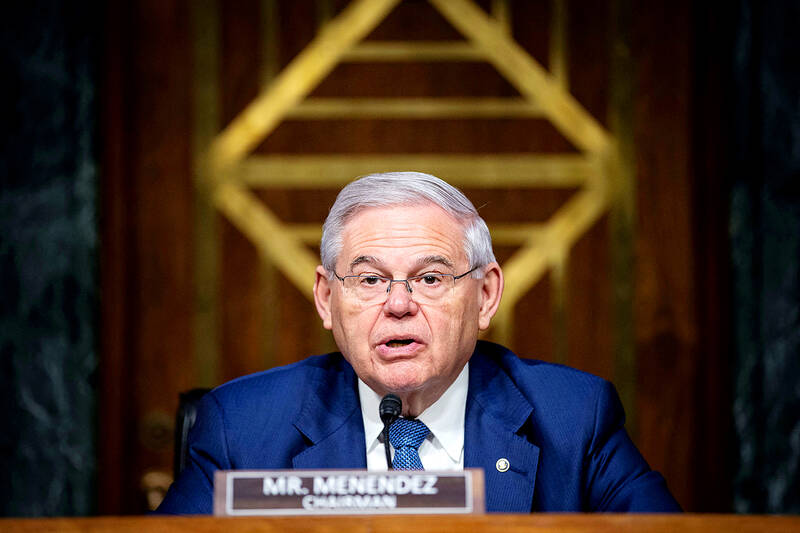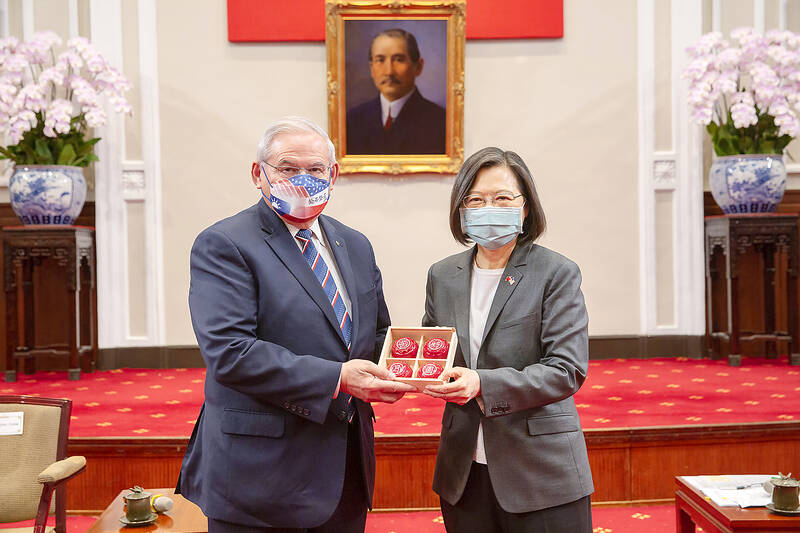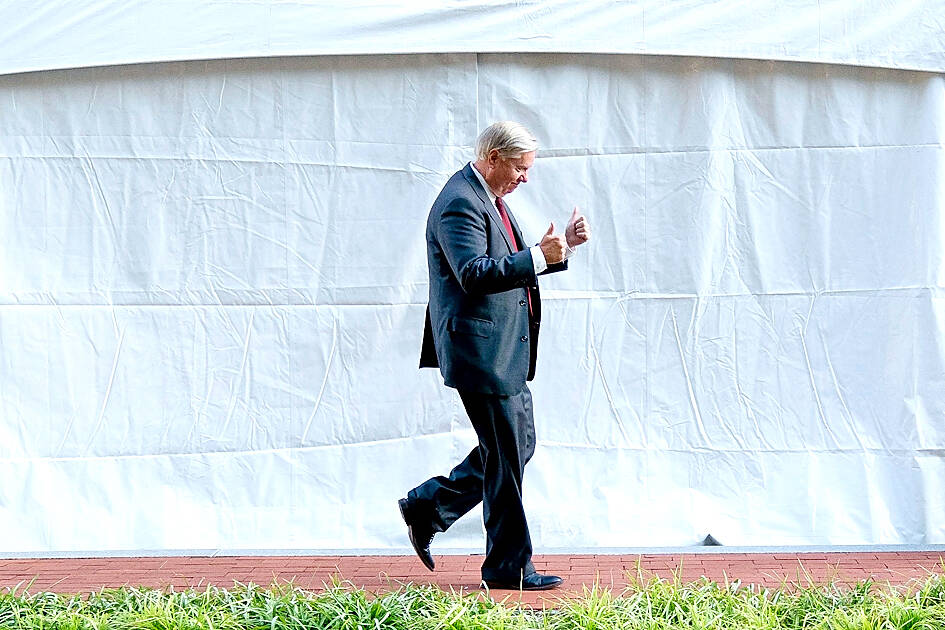A bill described by its sponsors as “the most comprehensive restructuring of US policy toward Taiwan since the Taiwan Relations Act of 1979,” was expected to receive bipartisan support at a committee hearing yesterday, one of its initiators said on Tuesday.
“I think we will have a strong bipartisan vote tomorrow that we’re working on,” US Senator Bob Menendez said a day before the US Senate Foreign Relations Committee, which Menendez chairs, was to mark up the draft Taiwan policy act (TPA).
The legislation includes clauses calling for an “enhanced defense partnership” between Taiwan and the US, under which Washington would provide Taipei with US$4.5 billion in foreign military financing.

Photo: Reuters
It also comes with symbolic gestures, including the renaming of Taiwan’s de facto embassy in Washington from the Taipei Economic and Cultural Representative Office to the “Taiwan Representative Office.”
Another provision would designate Taiwan as a “major non-NATO ally” for the purposes of expediting arms sales. The status is currently afforded to Australia, Israel, Japan, South Korea and others.
The bill has raised concerns in the White House.

Photo: Taiwan Presidential Office via AP
US National Security Adviser Jake Sullivan told Bloomberg last week that he would meet with congressional leaders to discuss the TPA, initiated by Menendez and US Senator Lindsey Graham.
“There are elements of that legislation, with respect to how we can strengthen our security assistance for Taiwan, that are quite effective and robust; that will improve Taiwan’s security,” Sullivan told Bloomberg’s David Rubenstein on Wednesday last week. “There are other elements that give us some concern.”
Bloomberg reported that Sullivan declined to go into detail, but it said that the US government was trying to strike a balance between supporting Taiwan while tamping down growing bipartisan hawkishness on Capitol Hill against China.

Photo: AFP
China’s Taiwan Affairs Office spokeswoman Zhu Fenglian (朱鳳蓮) yesterday said that China resolutely opposes the TPA, which “seriously violates” basic principles of international relations, the “one China” principle, and the Three Joint Communiques between the US and China.
Asked about yesterday’s committee session, Menendez told reporters in Washington on Tuesday that he and other senators did have “various conversations with the administration” over the proposed bill.
“We think we are landing in a good spot that can meet some of their concerns and at the same time have a very strong bill, and expresses the Senate’s intent of strengthening our relationship with Taiwan, of assisting Taiwan in its abilities to preserve its territorial integrity,” he said.
He said that the bill would not change the US’ policy toward Taiwan, but it would give “greater clarity about our willingness to help Taiwan.”
Asked if there were to be changes to the wording of the bill in the committee session, the senator said there would be “some edits to it, there will be some changes” as there normally are in any legislative process.
The support for Taiwan is important, Menendez said, citing the example of Lithuania, which has faced Chinese economic sanctions for months after allowing Taiwan to open a representative office in Vilnius last year.
“This is a test for the West. If we cannot help a country like Lithuania meet the challenge of China for deciding its own sovereign decisions, then we will lose this battle,” he said.

MAKING WAVES: China’s maritime militia could become a nontraditional threat in war, clogging up shipping lanes to prevent US or Japanese intervention, a report said About 1,900 Chinese ships flying flags of convenience and fishing vessels that participated in China’s military exercises around Taiwan last month and in January last year have been listed for monitoring, Coast Guard Administration (CGA) Deputy Director-General Hsieh Ching-chin (謝慶欽) said yesterday. Following amendments to the Commercial Port Act (商港法) and the Law of Ships (船舶法) last month, the CGA can designate possible berthing areas or deny ports of call for vessels suspected of loitering around areas where undersea cables can be accessed, Oceans Affairs Council Minister Kuan Bi-ling (管碧玲) said. The list of suspected ships, originally 300, had risen to about

DAREDEVIL: Honnold said it had always been a dream of his to climb Taipei 101, while a Netflix producer said the skyscraper was ‘a real icon of this country’ US climber Alex Honnold yesterday took on Taiwan’s tallest building, becoming the first person to scale Taipei 101 without a rope, harness or safety net. Hundreds of spectators gathered at the base of the 101-story skyscraper to watch Honnold, 40, embark on his daredevil feat, which was also broadcast live on Netflix. Dressed in a red T-shirt and yellow custom-made climbing shoes, Honnold swiftly moved up the southeast face of the glass and steel building. At one point, he stepped onto a platform midway up to wave down at fans and onlookers who were taking photos. People watching from inside

Japan’s strategic alliance with the US would collapse if Tokyo were to turn away from a conflict in Taiwan, Japanese Prime Minister Sanae Takaichi said yesterday, but distanced herself from previous comments that suggested a possible military response in such an event. Takaichi expressed her latest views on a nationally broadcast TV program late on Monday, where an opposition party leader criticized her for igniting tensions with China with the earlier remarks. Ties between Japan and China have sunk to the worst level in years after Takaichi said in November that a hypothetical Chinese attack on Taiwan could bring about a Japanese

The WHO ignored early COVID-19 warnings from Taiwan, US Deputy Secretary of Health and Human Services Jim O’Neill said on Friday, as part of justification for Washington withdrawing from the global health body. US Secretary of State Marco Rubio on Thursday said that the US was pulling out of the UN agency, as it failed to fulfill its responsibilities during the COVID-19 pandemic. The WHO “ignored early COVID warnings from Taiwan in 2019 by pretending Taiwan did not exist, O’Neill wrote on X on Friday, Taiwan time. “It ignored rigorous science and promoted lockdowns.” The US will “continue international coordination on infectious